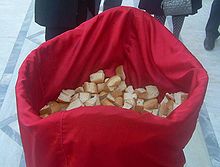Antidoron
Antidoron ( Greek ἀντίδωρον, "substitute gift") means blessed bread in the churches of the Byzantine rite , which is distributed after the celebration of the Eucharist . It is not the sacramental body of Christ and therefore not reserved solely for the Orthodox believers admitted to communion .
Liturgy-historical background
The antidoron is considered to be a remnant of the old church custom of the faithful to bring the food needed for the Eucharist , for agape and for the welfare of the poor to the church, where it was divided and used for various purposes. In fact, in medieval Constantinople, the Antidoron developed from the monastic celebration of Typika .
Today's custom
Today, according to a centuries-old custom, the parts intended for consecration are first removed from the bread prepared for the Eucharist . The remaining bread is cut into small pieces; these are blessed and distributed as antidora.
Related rites
Other Eastern Churches also know the same custom under different names, but do not practice it every Sunday. In the Roman rite there are bread blessings at various holy festivals, for example on the feast of St. Agatha .
In Taizé , after the Sunday Eucharist, blessed bread is regularly distributed to the unbaptized and to those Christians who do not want to communicate for personal reasons. Occasionally, blessed bread is distributed in ecumenical services.
literature
- Alphonse Raes: L'antidoron. In: Proche-Orient Chrétien. 3, 1953, ISSN 0032-9622 , pp. 6-13.
- Josef Andreas Jungmann : Missarum Sollemnia. A genetic explanation of the Roman mass. Volume 2: sacrificial mass. 3rd, improved edition. Herder, Vienna et al. 1952, p. 561 f.
